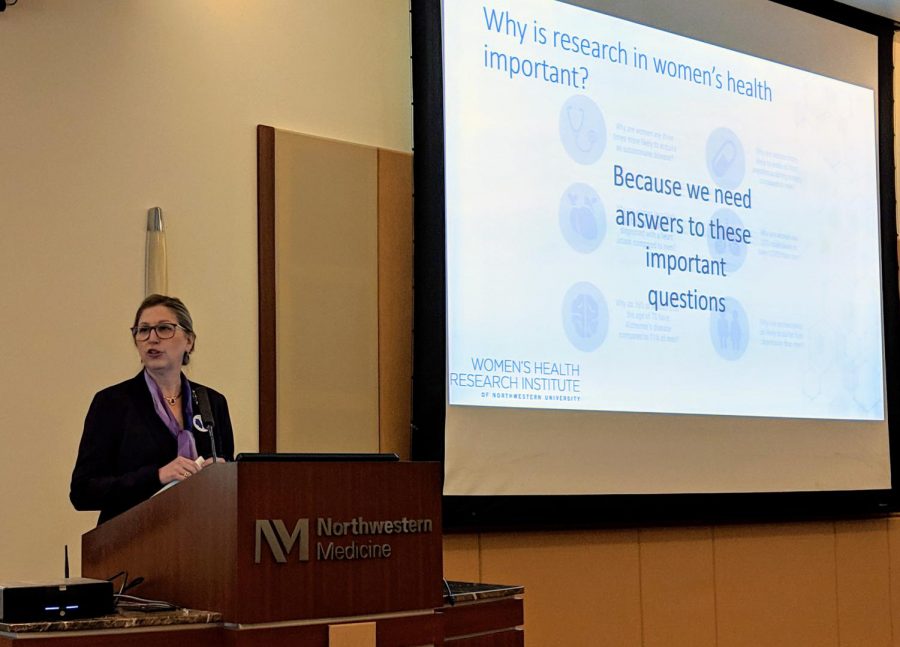Northwestern symposium celebrates sex-inclusive science, relaunches women’s health registry
Teresa Woodruff speaks at an NU celebration of Women’s Health Research Day. Woodruff founded the Northwestern Women’s Health Research Institute, which launched an upgraded version of their Illinois Women’s Health Registry on Jan. 25.
January 30, 2019
The Women’s Health Research Institute at Northwestern hosted its third annual Celebration of Sex-Inclusive Research on Friday. The symposium occurred just after U.S. Sen. Tammy Duckworth (D-Ill.) and U.S. Rep. Jan Schakowsky (D-Ill.) reintroduced a resolution designating Jan. 25 as Women’s Health Research Day.
Nicole Woitowich, the associate director of the Institute, said the symposium marked the third anniversary of the National Institutes of Health policy requiring scientists to consider sex as a biological variable.
“Historically speaking, women have been excluded from clinical research and basic science research,” Woitowich said. “We have decade-long gaps where women’s health wasn’t even being considered because males were considered the default.”
The celebration also served as a kick-off for the upgraded Illinois Women’s Health Registry, Woitowich said. The institute originally developed the registry in 2009 to make women aware of opportunities to participate in clinical research studies. Woitowich said the registry supports the goal of “sex-inclusive science” — with a registry of women available to researchers, not being able to find willing female participants for a study is no longer a valid excuse.
Woitowich said the recent upgrades seek to make the registry more accessible. One of the limitations of the old registry was that it was only available on a desktop computer or as a paper survey. The new platform is compatible with mobile devices and tablets, she added, making it accessible to women who cannot afford a desktop computer or don’t live near a major medical center.
Marla Mendelson, the co-director of the Women’s Health Research Institute, said she hopes the improved accessibility of the new platform makes it possible to engage a diverse group of women.
“We want data from women of all ages, all backgrounds, all ethnicities,” she said. “The more diverse group of women we have, the better the research is going to be coming out of that registry.”
The Friday symposium also included remarks by Mendelson and co-director Teresa Woodruff, as well as a keynote lecture by Stacie Geller, the director of the Center for Research on Women and Gender at the University of Illinois at Chicago.
In her lecture, Geller called attention to two different types of sex and gender inequities in the biomedical sciences. One is that even when women are included as participants in clinical trials, sex and gender are rarely analyzed in research.
“(Researchers) should always ask the question: is there a sex difference, and is there a gender difference?” Geller said. “No matter what you’re studying, it’s a relevant question to ask and answer … Cardiovascular disease, neurology, dermatology; they all have the potential to have sex and even gender differences.”
Geller said researchers should know the difference between sex and gender — sex is biological, while gender is cultural and societal — and analyze both in their work.
Another issue, Geller said, is that women are underrepresented as researchers in academic medicine. To improve the quality of science produced and healthcare provided, both areas of inequity must be addressed, she said.
Woitowich said the two levels of female representation in research may be tied together. Female researchers have been found to report sex and gender in their research more often than their male colleagues, she said, which may suggest that the inclusion of more women in STEM could lead to more representative research.
“If we could get more women leading the way in science and medicine, I think we’ll begin to see that sex and gender inclusion is just a norm,” Woitowich said. “Because I think that women realize, consciously or not, that this has an impact on their own health and they see the value in it.”
Email: andreamichelson2020@u.northwestern.edu
Twitter: @amichelson18


